I recently had a dear friend discover that she had ovarian cancer. Not long ago, that diagnosis would have had a very defined outcome. However, the doctor talked about surgery and asked her to get genetic testing to see if the cancer was dictated by BRCA1. Why did that matter? Because sequencing her genome would guide the physicians towards her best and most beneficial care.
She had the test performed by INVATE. They offer a variety of genetic testing for inherited cancers, heart disease and carrier screening. The power of genetic sequencing is having a real and positive effect on patients.
After her second surgery, she learned that the tumors had been sequenced. Why? To learn their individual genetic makeup to predict the efficacy of different treatments such as chemotherapies and immuno-therapies.
The power of DNA sequencing has definitely made its way to doctor-patient decision making. It was not long ago when there were standard treatments, one size fits most with a check in down the road to see if the therapy was working. With the democratization of DNA sequencing via benchtop devices such as Thermo Fisher’s ION Torrent, sequencing has become more accessible and more affordable.
Enter CRISPR – Clustered regularly interspaced short palindromic repeats. Scientists now have the ability to edit genomic information by excising the damaged DNA and repairing it. By “editing” damaged DNA, a new healthy protein can potentially be expressed. Some of the interesting biotech companies putting CRISPR to work for patients are:
Intellia Therapeutics with a pipeline for Hemophelia A and B, Transthyretin Amyloidosis and Hereditary Angioedema.
Editas Medicine focusing on Leber CongenitalAmaurosis 10 (LCA10), UsherSyndrome 2a (USH2A) and Autosomal DominantRetinitis Pigmentosa 4(RP4).
CRISPR Therapeutics with products for Hemoglobinopathies and Immuno-Oncology
Sangamo Therapeutics who have Phase 2/3 clinical trials for hemophelia, solid organ transplant, Sickle Cell and Fabry diseases. Watson and Crick knew they had discovered something powerful with DNA, but even they could have never imagined the powerful tools to come and the potential positive impact on patients and their quality of life.
